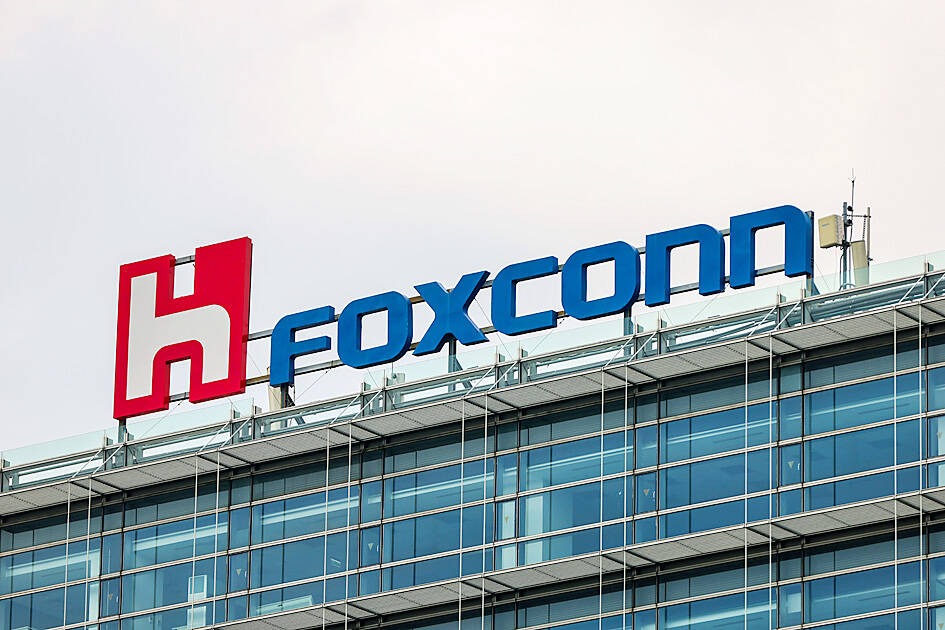Hon Hai Precision Industry Co (鴻海精密), the main supplier of Nvidia Corp artificial intelligence (AI) servers, posted a 3.16 percent year-on-year rise in sales last month and strengthened its first-quarter outlook.
Hon Hai, also known as Foxconn Technology Group (富士康科技集團), the world’s largest assembler of Apple Inc iPhones, reported revenue of NT$538.67 billion (US$16.4 billion) last month. The comparison with last year was skewed by the fact that this year the week-long Lunar New Year holiday fell last month, versus February last year.
On a monthly basis, revenue fell 17.74 percent as the Lunar New Year holiday reduced the number of working days.

Photo: Ritchie B. Tongo, EPA-EFE
As Nvidia’s most important AI server maker, Hon Hai’s performance is a bellwether for the AI infrastructure build-out.
The company said first-quarter sequential growth, or the increase from the December quarter, would be “better than the average level” of the past five years.
That is a rosier projection than the “roughly similar levels” the company teased last month. Growth on a year-over-year basis would be strong, a better outlook as well than that stated before.
Hon Hai, which ships electronics to the rest of the world from giant production bases in China, is grappling this year with uncertainty surrounding US President Donald Trump administration’s tariffs and the sustainability of the AI boom.
While big tech firms from Microsoft Corp to Amazon.com Inc this month pledged to continue spending to keep pace with a revolutionary technology, Chinese start-up DeepSeek’s (深度求索) rise has spurred doubts about whether all that infrastructure expenditure is justified.
“Hon Hai’s future growth is increasingly tied to AI servers — a segment in which it competes with other original design manufacturers such as Quanta Computer Inc (廣達), Inventec Corp (英業達) and Wistron Corp (緯創),” Bloomberg Intelligence analysts Steven Tseng (曾緒良) and Sean Chen said in a note.
“Hon Hai’s sales growth aligns with electronics manufacturing peers, with robust growth in the cloud segment offset by slower consumer electronics. Its profitability and valuation are both below peer average, dragged lower by iPhone assembly operations,” Chen said.

BYPASSING CHINA TARIFFS: In the first five months of this year, Foxconn sent US$4.4bn of iPhones to the US from India, compared with US$3.7bn in the whole of last year Nearly all the iPhones exported by Foxconn Technology Group (富士康科技集團) from India went to the US between March and last month, customs data showed, far above last year’s average of 50 percent and a clear sign of Apple Inc’s efforts to bypass high US tariffs imposed on China. The numbers, being reported by Reuters for the first time, show that Apple has realigned its India exports to almost exclusively serve the US market, when previously the devices were more widely distributed to nations including the Netherlands and the Czech Republic. During March to last month, Foxconn, known as Hon Hai Precision Industry

Taiwan Semiconductor Manufacturing Co (TSMC, 台積電) and the University of Tokyo (UTokyo) yesterday announced the launch of the TSMC-UTokyo Lab to promote advanced semiconductor research, education and talent development. The lab is TSMC’s first laboratory collaboration with a university outside Taiwan, the company said in a statement. The lab would leverage “the extensive knowledge, experience, and creativity” of both institutions, the company said. It is located in the Asano Section of UTokyo’s Hongo, Tokyo, campus and would be managed by UTokyo faculty, guided by directors from UTokyo and TSMC, the company said. TSMC began working with UTokyo in 2019, resulting in 21 research projects,

Taiwan’s property market is entering a freeze, with mortgage activity across the nation’s six largest cities plummeting in the first quarter, H&B Realty Co (住商不動產) said yesterday, citing mounting pressure on housing demand amid tighter lending rules and regulatory curbs. Mortgage applications in Taipei, New Taipei City, Taoyuan, Taichung, Tainan and Kaohsiung totaled 28,078 from January to March, a sharp 36.3 percent decline from 44,082 in the same period last year, the nation’s largest real-estate brokerage by franchise said, citing data from the Joint Credit Information Center (JCIC, 聯徵中心). “The simultaneous decline across all six cities reflects just how drastically the market

Ashton Hall’s morning routine involves dunking his head in iced Saratoga Spring Water. For the company that sells the bottled water — Hall’s brand of choice for drinking, brushing his teeth and submerging himself — that is fantastic news. “We’re so thankful to this incredible fitness influencer called Ashton Hall,” Saratoga owner Primo Brands Corp’s CEO Robbert Rietbroek said on an earnings call after Hall’s morning routine video went viral. “He really helped put our brand on the map.” Primo Brands, which was not affiliated with Hall when he made his video, is among the increasing number of companies benefiting from influencer